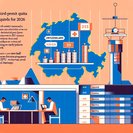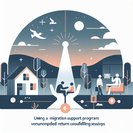
State Secretary Martina Hirayama led the Swiss delegation to London on 21 November 2025 for the third meeting of the Swiss-British Joint Committee on Science and Innovation. The body was created under the 2022 bilateral Memorandum of Understanding and oversees collaborative programmes worth CHF 80 million.
Participants hailed progress in joint quantum-computing and life-sciences projects and agreed to explore a common ‘talent visa light’ template that would ease short-term researcher exchanges of up to 180 days without triggering work-permit quotas. Officials stopped short of announcing a concrete policy but tasked a working group with drafting proposals by mid-2026.
![Swiss-UK Committee Pledges Deeper Science & Innovation Ties and Stresses Researcher Mobility]()
The meeting took place against the backdrop of Switzerland’s pending association to Horizon Europe and the UK’s re-entry into the programme in 2024. Both sides said seamless mobility for scientists is essential to maximising return on research funding. SwissInnovation, an industry body, wants Bern to replicate the UK’s Innovator Founder visa in reverse so that British spin-off founders can base themselves at Swiss incubators with minimal red tape.
For global mobility managers the immediate takeaway is that the existing Services Mobility Agreement (which allows up to 90 days visa-free work) remains the main tool for short stays, but a bespoke science visa could follow. Companies involved in joint R&D ventures should monitor the working group’s recommendations, expected to address spousal work rights and social-security coordination.
The next committee meeting will be held in Bern in November 2026.
Participants hailed progress in joint quantum-computing and life-sciences projects and agreed to explore a common ‘talent visa light’ template that would ease short-term researcher exchanges of up to 180 days without triggering work-permit quotas. Officials stopped short of announcing a concrete policy but tasked a working group with drafting proposals by mid-2026.

The meeting took place against the backdrop of Switzerland’s pending association to Horizon Europe and the UK’s re-entry into the programme in 2024. Both sides said seamless mobility for scientists is essential to maximising return on research funding. SwissInnovation, an industry body, wants Bern to replicate the UK’s Innovator Founder visa in reverse so that British spin-off founders can base themselves at Swiss incubators with minimal red tape.
For global mobility managers the immediate takeaway is that the existing Services Mobility Agreement (which allows up to 90 days visa-free work) remains the main tool for short stays, but a bespoke science visa could follow. Companies involved in joint R&D ventures should monitor the working group’s recommendations, expected to address spousal work rights and social-security coordination.
The next committee meeting will be held in Bern in November 2026.









